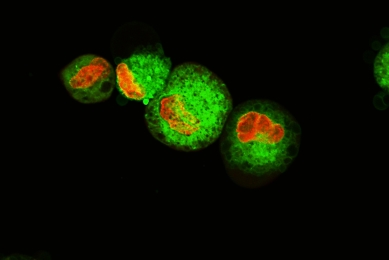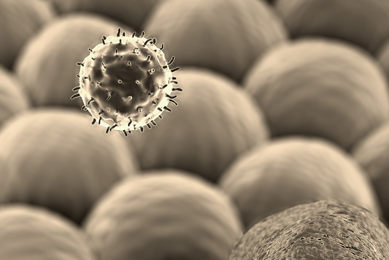ATCC launches advanced immuno-oncology (IO) research models
ATCC’s scientists presented posters highlighting two new innovative product lines. These new tools were designed to enable IO cell-based assay development by addressing physiological relevance in efforts to enhance predictive responses to a variety of drug modalities.
John Foulke’s poster launched our new CAR-T Target Cells which are luciferase-labeled tumor cell lines that have high endogenous expression of clinically relevant CAR-T target antigens such as CD19, CD20, and HER2. These robust cell models are representative of the most predominant carcinoma and lymphoma cancer lines used in oncology research. The CAR-T Target cells facilitate convenient and consistent immuno-therapeutic development by allowing you to monitor the potency and efficacy of candidate CAR-T effector cells in cytotoxicity and cell viability assays.
Hyeyoun Chang’s poster focused on a series of tumor and immune cell lines with high endogenous expression of checkpoint inhibitory and co-stimulatory expression levels that ATCC will launch in 2023. This portfolio includes a wide range of IO targets such as: PDL1/2, B7-H3, PD1, CTLA-4, and others. These novel cell lines can be incorporated into simple blocking assays or be integrated into sophisticated co-culture cell-based drug screening assays.
Additionally, ATCC showcased our wide array of fully authenticated cell lines for cancer immunology that have been used for decades to help researchers discover and develop some of the most notable advancements in biomedical research. Our primary immune cells are physiologically relevant effector cells that exhibit high differentiation capacity and immune activity.
As the trusted gold standard for cell lines in oncology research, ATCC has an extensive collection of human cell lines with unique and desirable molecular signatures used as therapeutic targets. We boast over 5,000 cancer models that express widely studied and rare tumor antigens and signaling pathways involved in cancer progression.
ATCC also offers tumor organoids, which are game changers for IO research. We have over 200 patient-derived models from primary, metastatic, and recurrent tumors derived from common as well as rare and understudied cancers from numerous tissue types.
The final evening featured a rocking concert by The CheckPoints, the official SITC house band, which is comprised of a multi-talented group of PhDs and MDs who are luminaries in the field of cancer immunotherapy. Altogether, SITC 2022 was a huge success! We were delighted to engage in lively scientific exchanges, to network with leaders in IO, and are proud to be included in the IO family. We look forward to partnering with the SITC community to innovate and improve cancer drug development, patient outcomes, and making the promise of cancer immunotherapies a reality for all cancer patients. See you next year in San Diego!
Did you know?
ATCC recently released CAR-T Target Luciferase Reporter Cells that can be incorporated into multiple CAR-T efficacy assays.
Shalmica Jackson, PhD
Marketing Segment Manager, ATCC
Shalmica Jackson, PhD is the Marketing Segment Manager for Drug Discovery and Development at ATCC. Shalmica is responsible for driving revenue growth for the biopharmaceutical industry through the development of relevant offerings, marketing strategies and execution of associated marketing plans worldwide. She received her PhD in Molecular and Integrative Physiology and Toxicology from the University of Kansas Medical Center, and completed a Postdoctoral Fellowship in Cell Biology at the University of Texas Southwestern Medical Center. She has over 20 years of experience in the life science industry, serving as a Senior R&D Scientist in drug development for 10 years before transitioning into marketing.
Browse our immunotherapy research tools

Immunology
ATCC supplies the credible cells you need to develop cancer immunotherapies and immune system disorders and illnesses.
More
CAR-T Target Luciferase Reporter Cells
ATCC generated luciferase reporter solid and liquid tumor cell lines that express tumor antigens such as CD19, CD20, and HER2. Learn how you can incorporate these target cells into your T-Cell cytotoxicity assays to enable your breakthroughs in immuno-oncology.
More
Immune Cells
ATCC primary immune cells support your physiologically relevant research projects, including toxicity screening, transplantation and graft rejection, inflammation and allergy, vaccine, drug development, immune disorders, and cancer immunology studies.
More